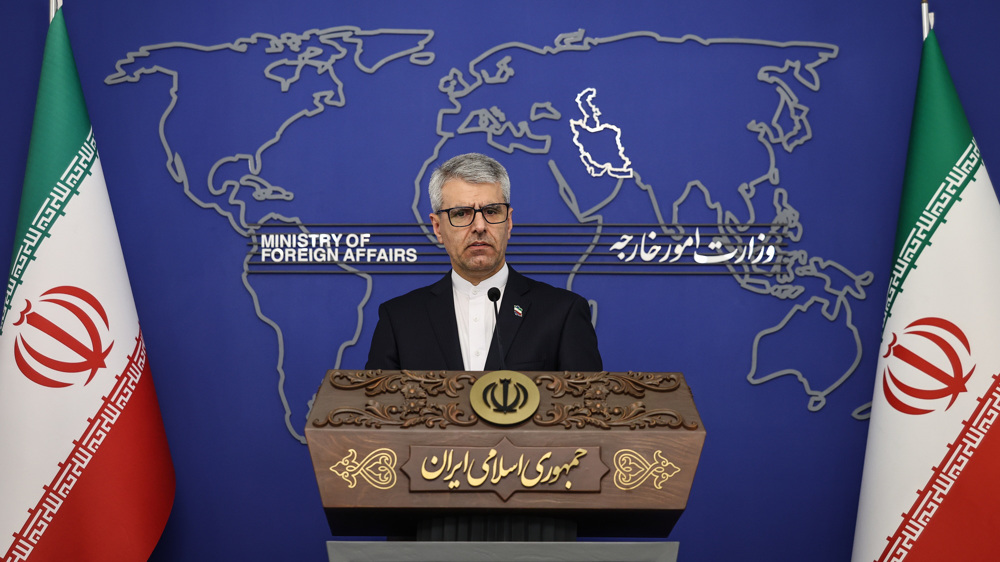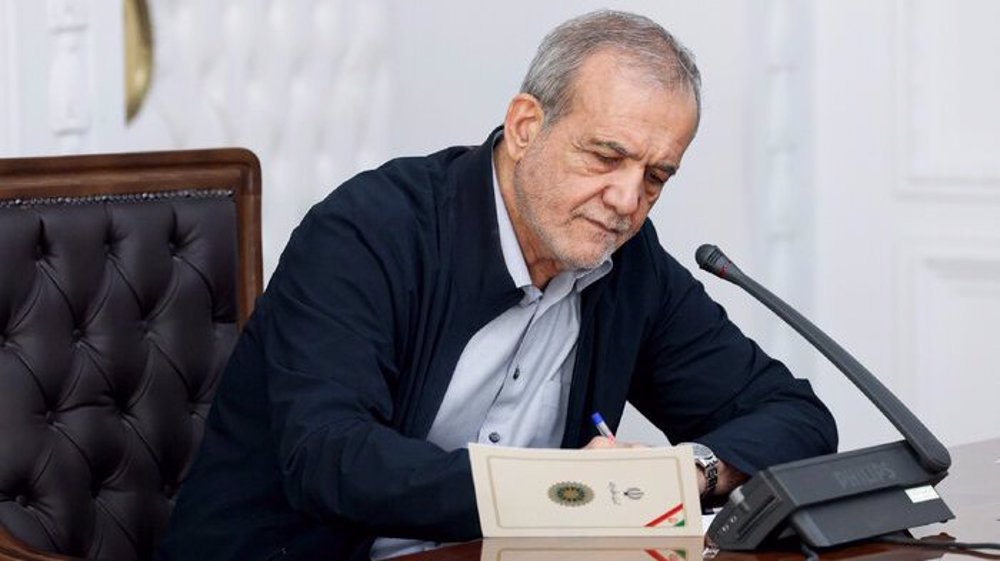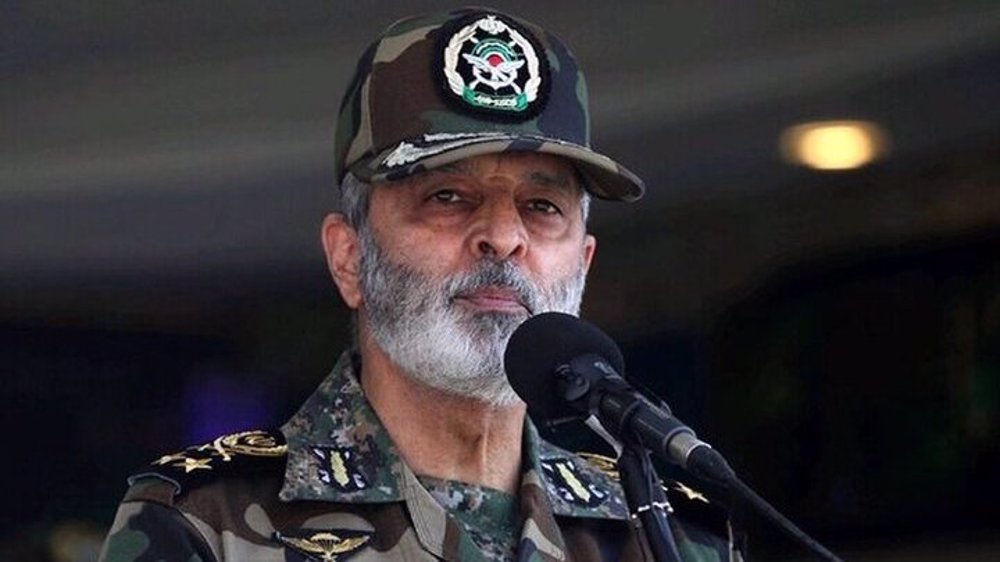US travel ban regrettable, misguided policy: Iran FM
Iranian Foreign Minister Mohammad Javad Zarif says it is regrettable that the US Supreme Court has decided to partially reinstate President Donald Trump's travel ban on refugees and people from six Muslim-majority countries, warning that the move can fuel extremism in the region.
“It's regrettable that the citizens of the countries on the list have never participated in any act of terrorism against the United States and yet they are punished for acts of terrorism that have been committed by citizens of other countries who are not on the list,” Zarif said in a joint press conference with German Foreign Minister Sigmar Gabriel in Berlin on Tuesday.
“We always believed that the Muslim ban that President Trump imposed soon after assuming office had no basis in facts and it would not help fight terrorism,” he added.
The US Supreme Court on Monday partially reinstated the travel ban restricting citizens of Iran, Libya, Somalia, Sudan, Syria and Yemen from traveling to US.
People from the six countries and all refugees are not allowed to enter the US unless they have “a credible claim of a bona fide relationship with a person or entity in the United States,” according to the court.
The top Iranian diplomat criticized the US Supreme Court's move as a “misplaced and misguided policy” and emphasized that it “would be the greatest gift to extremist groups who would use it as a rallying cry to attract new followers.”
“It is regrettable that the Supreme Court decided to overrule the decisions of the previous courts or at least consider overruling them, if you want to be more exact,” Zarif said.
He said the Supreme Court’s decision would fail to increase anybody’s security.
“It is not a call for putting anybody else on the list, but it’s just the problem that for some terrorism and support for terrorism is measured by the amount of money they spend on buying arms from the US and not by actually being involved in acts of terrorism,” the Iranian foreign minister pointed out.
On his first foreign trip, the US president visited Saudi Arabia and sealed arms deals worth almost $110 billion (98 billion euros) with Riyadh.
Read more:
- US-Saudi seal weapons deal worth $110 billion
- 'US arms deal with Saudi, disaster for Mideast'
- US lawmakers seek to block Saudi arms deal
Need for international efforts to settle regional conflicts
The Iranian foreign minister also stressed the importance of making international efforts to help settle the existing conflicts in the region.
He added that the Middle East could not bear new conflicts and emphasized that there was no military solution to the regional issues.
The Islamic Republic believes that the regional crises must be settled through political approaches, Zarif said.
He also pointed to good relations between Iran and Germany based on mutual respect and common interests and urged the two countries to use all means to strengthen their financial and banking ties following the removal of “unfair sanctions” on Tehran.
“Iran is a safe country in a region suffering from instability and terrorism,” Zarif said, adding that Iran was a democratic country and could be a good partner for Germany.
Under a nuclear agreement, known as the Joint Comprehensive Plan of Action (JCPOA), reached between Iran and the P5+1 group of countries in January 2016, Iran undertook to put limitations on its nuclear program in exchange for the removal of nuclear-related sanctions imposed against Tehran.
Iran and the five permanent members of the United Nations Security Council – the United States, France, Britain, Russia and China – plus Germany signed the mammoth agreement in July 2015 and started implementing it in January 2016.
Direct talks needed to resolve Qatar crisis
The German foreign minister, for his part, said all sides involved in the Qatar crisis should hold direct talks to avoid further escalation.
He said “now is the time to not inflame the conflict further and to talk with one another,” adding, “It's necessary to come to the table and then negotiate.”
Gabriel also said he expected Tehran to play a constructive role in finding a solution to the Qatar crisis.
Saudi Arabia, Bahrain, Egypt, and the United Arab Emirates cut ties with Qatar on June 5, officially accusing Doha of supporting "terrorism" and destabilizing the region. Qatar, however, has slammed the measures as unjustified, saying they were based on false claims and assumptions
In their apparent bid to secure US support and that of Israel, Riyadh, Manama, Cairo and Abu Dhabi suspended all land, air and sea traffic with Qatar, expelled its diplomats and ordered Qatari citizens to leave their countries.
To further pressure Qatar, Saudi Arabia has totally closed its land border with its neighbor, through which much of Qatar's food supply crossed.
The German foreign minister also said he was working closely with the KfW bank to make sure that business agreements can be completed with Iran.
Bigoted restrictions will not make US secure: Zarif
Later in the day, the Iranian foreign minister took to Twitter to say that a “bigoted” travel restriction on Muslims would not keep the US safer.

“Instead of policies empowering extremists, US should join the real fight against them,” Zarif added in his Twitter post on Tuesday.
VIDEO | Press TV's news headlines
Over 100 Palestinians displaced as Israel razes residential building in occupied East al-Quds
Iran secures Zurkhaneh World Cup title in India
VIDEO | Karachi observes Yalda Night with tribute to Palestine, Lebanon resistance
New Israeli restrictions threaten lifesaving care in Gaza, MSF warns
VIDEO | Egypt-Israel gas deal & its repercussions
Hands off Iran: Iranian workers protest, but refuse to fall into US 'regime change' trap
Unmasking AIPAC leadership: Power brokers behind America’s most influential Israeli lobby









 This makes it easy to access the Press TV website
This makes it easy to access the Press TV website